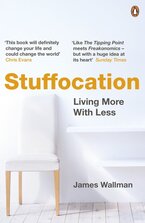 When you talk about decluttering, minimizing, organizing, or even just tidying up, you likely speak in subjective terms. "I prefer that over there" or "I feel overwhelmed by how much I own." Organizing as it relates to the maintenance of a home or lifestyle is considered a soft science, if a science at all. When we think of research our minds often go to the covers of housekeeping magazines or pretty pinterest boards. Rarely do we consider the science behind our stuff-- not just where we ought to keep it but why it exists at all (and why we felt so compelled to purchase it). And those books and articles that claim to have the solution to this stuff often rely on anecdotal evidence to support a philosophy that, at the end of the day, may work for a collection of individuals but is unlikely to become the prevailing way of life for society as a whole. Books I've reviewed on this very blog have waxed poetic on the virtue of minimalism and its superiority over consumerism without a single page dedicated to the reality of how consumerism came to be the prevailing mode of thought in developed nations. Going into Jame's Wallman's Stuffocation, it was apparent from the first page that is not the typical knee-jerk reaction to materialism. Instead, I found a comprehensive history of consumer culture and post-consumerism with psychological, sociological, and economic inquiry into how we came to this point of over-saturation, and how, with reliable methods of forecasting, we can predict society's future relationship with owning too much stuff. Stuffocation touches on the invention of materialism in 1920's and 30's America, and explores the reactive trends of minimalism, elective simplicity, and relaxed ambitions. What was incredibly refreshing about Wallman's take on these modern trends was his ability to explore their values without coming to the automatic assumption that they are solutions to stuffocation by virtue of being its direct opposite. Rather, he admits to our human need to display social health, and extols the value of objects without conflating that with a value on materialism and over-consumption. Wallman makes realistic predictions about future trends regarding human consumption and the switch from objects to experiences. These predictions are supported not by anecdotes, or the oft-made error of confusing correlation for causation, but tried-and-true scientific methods of predicting social trends. Wallman foresees a society in where we see "experience as a substitute for stuff, not shedding completely our need for external fulfillment but finding a better source. Not a reaction to materialism but an entirely different way of thinking that doesn’t involve materialism at all." While Stuffocation rejects many of the trends we previously saw as potential solutions, it does so in a way that reminds us that we can make a change not simply by reacting, but evolving, and creates a hopeful and realistic vision of our future relationship with stuff.
0 Comments
Leave a Reply. |
AuthorWrite something about yourself. No need to be fancy, just an overview. Archives
May 2018
Categories |
Proudly powered by Weebly
 RSS Feed
RSS Feed